|
|
Reviewed by Glenn Erickson
Car movies are their own special thing in America. My unsupported belief (I have many) is that one of America's big attractions for men around the world is the idea of having the freedom of one's own car on an open highway. Shows that glorify car customizing and street racing have always had a universal appeal. Old hot rod movies, and existential road pictures like Thunder Road (I need to review that gem) grab us as well. American Graffiti is a classic in this regard, and Monte Hellman's Two-Lane Blacktop is perhaps the zenith of hot-rod / open road existentialism. Although I don't recommend saying this around Peter Bogdanovich, Howard Hawks finally revealed that he was twenty years out of touch with his Red Line 7000, a glossy, fake tale of stock car racing. James Caan leads a pack of racers that behave like gunslingers, yet form a standard male professional unit, as in other Hawks epics.
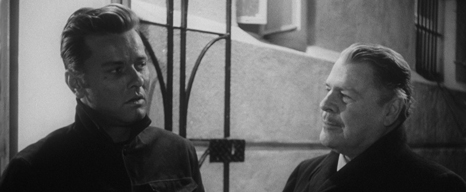
The gem in the genre is Jack Hill's commercially invisible Pit Stop, a winning little drama that had all the right moves, and wasn't topped until Hellman and Lucas came along. Disagreeably pigeonholed as the Roger Corman protégé of the 1960s who didn't become a household name, the independent thinker Jack Hill arrived with the other early Corman associates Hellman and Coppola, to do patch-up writing and directing work. Even as Corman moved into edgier subject matter, he still liked old-fashioned car race movies, and backed Pit Stop for Jack Hill to direct. 1 Thus Hill found himself in full control of his modest movie idea, to be filmed right in Los Angeles, mostly at the long gone Ascot Park Speedway in Gardena.
Hill decided that figure 8 racing would be a great subject because the track had an intersection -- the crashes needed to keep an audience excited occur constantly. Halfway between a stock car race and a demolition derby, figure 8 racing isn't quite as dangerous as standard races, if only because speeds aren't as high.
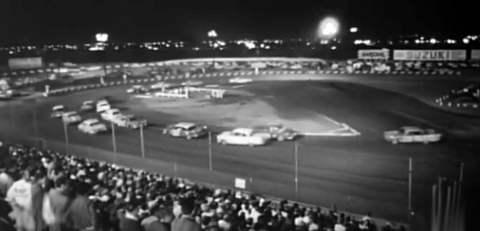
Hill gathered a great cast of wannabes and once-weres. Richard Davalos had been mostly overlooked as James Dean's brother in East of Eden; he brings a tinge of bitterness to his role as Rick Bowman, a friendless street racer who is jailed after a contest ends with one car slamming into a house. Veteran Brian Donlevy plays Grant Willard, a race promoter who profits several ways on the Figure 8 circuti. He invests in cars and drivers, and owns part of the race venue itself. From Jack Hill's oddball horror opus Spider Baby come all-purpose freak Sid Haig - actually a very talented performer -- and the interesting Beverly Washburn, an ex-child star that Hill considered his favorite actor. And slipping into the mix is Ellen Burstyn, then known as Ellen Mcrae. After ten years' experience in TV, Burstyn made her big career move at this time, missing with this film and Joseph Strick's Tropic of Cancer, but striking pay dirt in Bogdanovich's big hit The Last Picture Show.

Pit Stop is a straight drama with a clean dramatic arc for its uptight, self-absorbed hero. Rick resents being bailed out of jail by Willard, who intends to recruit him as a new figure-8 driver, to provide competition for his present star, Hawk Sidney (Sid Haig). The flamboyant, boastful Sidney always wins but Willard intuits that the races need new blood. The brooding Rick at first thinks the figure 8 track is insane, but picks up the challenge. He goes to work at a junkyard and talks his boss into fronting him for a car, only to be wiped off the track more than once. Then an older veteran gives Rick some tips in aggressive track etiquette. From that point forward he drives like a combat pilot. Rick soon eclipses Hawk on the track, and takes his girlfriend Jolene (Beverly Washburn) as well. Hawk stays on, but is more subdued. Rick then set his sights on straight stock car racing, which Willard owns a piece of as well. He goes right to the top and challenges the current favorite Ed McLeod (George Washburn). Despite having Jolene in tow, Rick makes moves on Ed's wife, seasoned mechanic and racing expert Ellen McLeod (Ellen Burstyn). The alienated Rick Bowman has found his groove -- winning -- but stays emotionally separate from every thing and everybody.
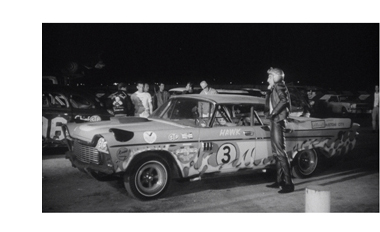
Jack Hill delivers pretty much all one would want in this fast-paced thriller. The opening could pass for docu coverage of a disastrous street race, and the figure 8 sequences have all the collisions and smashed cars that we immature Americans love to see. The rivalry between Sid Haig and Richard Davalos' characters is refreshingly free of clichés. Hawk Sidney brags and boasts and baits Rick at every opportunity, and then beats him mercilessly for winning, and taking his girl. But Hawk's spirit is effectively broken, and he later apologizes. It's a subtle twist on the one-upsmanship game. Meanwhile, the script keeps reinforcing the idea that the cheerful fat cat Willard profits on everything that happens, regardless who wins, without risking anything. The races are a circus that takes special skills. The competitors jousting on the track are too focused on the Art of the Game to realize that they're not Knights, but Pawns.
In the extras Jack Hill says that his show failed to get major distribution for two reasons. It was made in B&W just as color became a commercial necessity. In 1969, a B&W second feature release had to go begging for bookings. He also had to change his title The Winner because of Paul Newman's widescreen color racing epic, Winning.
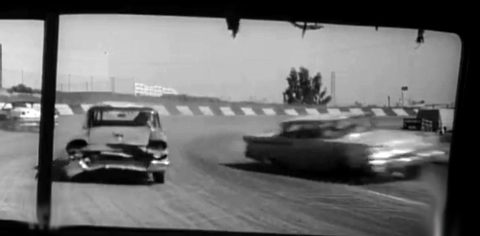
Pit Stop works today because it isn't afraid to critique its competitive hero. Rick Bowman wins because he gives value to nothing else. His big ideas seem good for everybody, but invariably enhance his career progress first. His women get nothing. In the final race, perhaps only he knows to what degree he set out to slaughter his competition. It's a race and he's not fully responsible, but Rick knows how he won and who has paid a price for his success. Jack Hill's script sketches the nature of competition without overstating its drawbacks. Rick isn't quite a Spaghettii western cynic, but he's definitely a cold-blooded realist. He an immediate antecedent for Robert Redford's very similar anti-heroic Olympic skier in Michael Ritchie's Downhill Racer. Those two heels would understand each other perfectly.
Dick Davalos isn't the most expressive of actors but he's a fine choice for Rick. Our champion is cheerfully personable when he wants to be and an unresponsive brick when he doesn't, as when he wearies of his girlfriend's efforts to emotionally engage with him. Top-billed Brian Donlevy was in some pretty sad shows near the end. His Willard is an important character, who almost alone makes the racing racket we see seem a credible enterprise. He's a fair guy who's
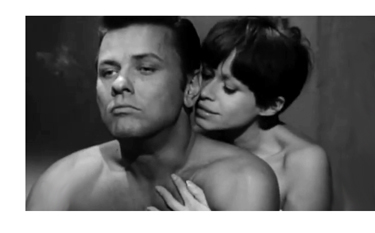 found a good niche in the system -- and he doesn't deceive any of his recruits. This is probably Sid Haig's best role. He's initially a wild-eyed nut, but soon shows the emotional depression behind the bravado. At first a true S.O.B., by the finish we'd rather have Hawk as a friend over Rick any day.
found a good niche in the system -- and he doesn't deceive any of his recruits. This is probably Sid Haig's best role. He's initially a wild-eyed nut, but soon shows the emotional depression behind the bravado. At first a true S.O.B., by the finish we'd rather have Hawk as a friend over Rick any day.
Beverly Washburn's Jolene is too bright and vivacious to be a bimbo; the role allows her to sketch a young woman eager to do good and make people happy. That Rick tosses Jolene away, pretty much shuts the door on our opinion of him. Equally complex is Ellen Burstyn's Ellen. She's first seen welding away and talking car talk better than the boys. Even though we expect Rick to attract every woman who enters the scene, when Ellen goes for him the situation seems entirely fresh. Pit Stop plays like... well, like a real movie. The perfectly cast actors get to sculpt vivid characters that hold our attention.
The worthy Pit Stop fell victim to a commercial roadblock. I can see Jack Hill feeling frustrated when his movie disappeared, while a piece of dreck like Fireball 500 continued to play the drive-ins for years.
The camerawork is gritty on the track and quite handsome in the dialogue scenes, finding a nice 'independent' B&W look to flatter the actresses and make Dick Davalos come off as moody and conflicted. Jack Hill's expert editing is in evidence as well. Pit Stop hasn't the art-movie existential vision of Two-Lane Blacktop, but in its own home-grown way it's just as satisfying.
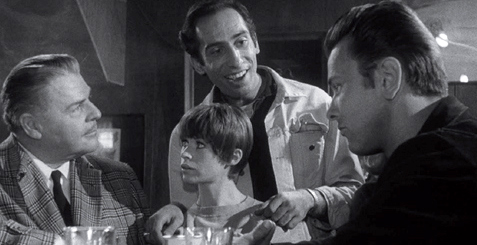
Arrow Video USA's Blu-ray + DVD of Pit Stop is a great-looking disc of Jack Hill's personal production. He's apparently kept its elements in good shape all this time -- the show still carries a title reading "The Winner." The rich HD image looks great both for the caught-on-the-fly crash-bang racing action and Hill's dramatic material. Scenes in a go-go dance club are impressive, and Austin McKinney's close-in work flatters Ms's Burstyn and Washburn. For the car club crowd, Hill has one scene in the workshop of the famed car customizer George Barris, where a brief pan gives us a look at several hot rods in the works and finished. That's a bit of a time capsule, for certain.
Hill makes excellent use of a guitar-driven music track over wide scenes and transitions. 'The Daily Flash' is credited; their sound has an impressive psychedelic edge.
Arrow's extras take us deeper into the pre- Easy Rider years, before Roger Corman founded his New World distributorship. Calum Waddell prompts director HIll through the whole story on the feature commentary; we can tell that Hill is proud of this show, as he seems to have no regrets about it at all. Their discussion moves to other interesting subjects as well. Three personalities are each given a featurette of substance. The key one is Crash and Burn!, a quarter-hour with the unprepossessing, candid Jack Hill. As on his extras for Spider Baby he comes off as instantly likeable. Actor Sid Haig carries Drive Hard, a personal memory of the show; Haig is usually the first name linked with director Hill. A very special extra is Roger Corman's Life in the Fast Lance, an interview with a higher interesting detail-to-breezy generality ratio than anything he's done. Corman talks about his European car race movies and gives hard information about the commercial realities of exploitation movies in the 1960s. He tells us that Jack Hill's Philippine-shot Women In Bondage movies put his fledgling New World operation into the black. Corman clearly knew more about show business survival than anybody. Corman went for this particular genre because he knew how well car race movies did in the Southern drive-ins.
A shorter restoration extra gives the lowdown on what seems to have been a fairly happy remastering process. The trailer makes Pit Stop look like a winner -- if only it were in color. Ironically, if it were in color it probably wouldn't be as good.
Thanks to Christopher Koenig for an important correction.

On a scale of Excellent, Good, Fair, and Poor,
Pit Stop
Blu-ray + DVD rates:
Movie: Very Good
Video: Excellent
Sound: Excellent
Supplements: Audio commentary with Jack Hill; featurettes Crash and Burn!, Drive Hard and Life in the Fast Lane, restoration demo, trailer.
Deaf and Hearing-impaired Friendly?
YES; Subtitles: English
Packaging: One Blu-ray and DVD in keep case
Reviewed: July 26, 2015
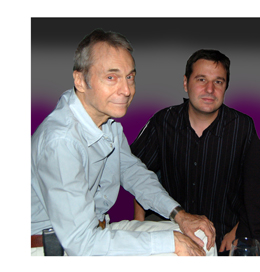
Footnote:
1. I'm assuming that Corman was not directly credited on Pit Stop and various other movies, like Targets, to allow those shows to be shot non-union, under the Guild jurisdiction radar. This thought is more than a theory, but less than certain. If Roger Corman was an industry pirate, he had more integrity than many of the big boys at the top -- his core reputation was as an honest (if tough) deal maker.
Return
2. This is Jack Hill and David Gregory in 2007, at a launch party on Hollywood Blvd. for Trailers from Hell. Gregory had just finished directing Plague Town. We were able to spend the better part of an hour talking with the gracious Mr. Hill.

Text © Copyright 2015 Glenn Erickson
See more exclusive reviews on the Savant Main Page.
The version of this review on the Savant main site has additional images, footnotes and credits information, and may be updated and annotated with reader input and graphics.
Return to Top of Page
|

